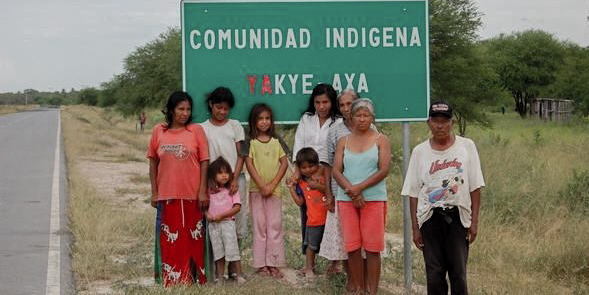






The Yakye Axa Community (translated to English as “Island of Palms”) is an indigenous community from the Lengua Enxet Sur people. They live in the Paraguayan Chaco, their ancestral land, and their community consists of 319 people, grouped in approximately 90 families. At the end of the 19th century, large tracts of land in the Paraguayan Chaco were sold through the London stock exchange. As a result of the acquisition of these lands by British businessmen, several missions of the Anglican church began to settle in the area. Also, some ranches were established in the area, where the indigenous people who inhabited these lands were employed.
In 1979, the Anglican Church started a development project for indigenous communities and purchased large tracts of land, including a ranch called “El Estribo”, to which members of the Yakye Axa Community moved. However, their living conditions did not improve, and in 1993 they decided to return to their territory, which now was part of “Estancia Loma Verde”, a ranch whose managers did not allow their return. Since then, between 28 and 57 families settled on the side of the road in front of the ranch and began to claim their lands without any response from the Paraguayan State. Due to extreme poverty conditions, sixteen people died during the protests.
Impact:
The Inter-American Court acknowledged the right to collective land ownership for indigenous people, considering the special meaning that their ancestral territory has as the fundamental basis of their culture, spiritual life, integrity and economic sustainability.
The Inter-American Court also determined the State’s responsibility for the failure to adopt measures to deal with the conditions of poverty and lack of access to basic services that the Yakye Axa Community was experiencing, particularly children and elders.
The Inter-American Court also concluded that the ancestral land ownership of the indigenous peoples over their territories has equivalent effects to the title of full ownership granted by the State and that those who due to causes beyond their control, have left or lost possession of their lands, must retain the right of ownership even in the absence of a legal title and even when the lands are in private hands.
It also established that in order to guarantee the rights of indigenous peoples, States must interpret and apply the norms according to their cultural identity.
Access the case in our database: https://sidh.cejil.org/en/entity/uwuvs5aqd75vcxr
Help us continue this critical and urgent work with a donation!
DONATE NOW